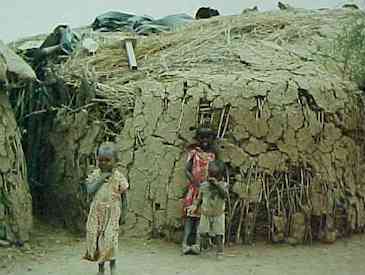| The Maasai are one of the few tribes in Africa that still exist today. They speak the language of Maa and live in small villages called kraals or bomas. Their main god, Engia, blesses them with children and cattle each year. Cows are the base of Maasai everyday life. They provide blood to drink, milk, meat, and hide for clothing. There are many flies because the Maasai live near their cattle. Unfortunately many children have serious diseases such as trachoma, malaria, and upper respiratory tract infections. |
Three Maasai children next to their house. |
| The Maasai have arranged
marriages. Girls as young as 13 may marry. Their grooms are often many years
older than the bride. Men have any number of wives. Since hair is a sign of
assertiveness in the Maasai culture, the women shave their heads out of respect when a
girl gets ready to marry. Before she leaves her village to meet her husband, her
father spits a blessing of milk on her bald head and breasts saying, "Mekinchoo enkai
enkerra kumok" or "May god give you many children." As she leaves,
she is warned not to look back for fear that if she does, she will turn to stone. As
she gets closer to her destination, the women of the other village come out to greet her,
shouting insults at her to scare off any bad spirits. At her new home, she refuses
to go into the house until she is satisfied with the gifts offered to her. She must
build the houses. The houses are made of sticks, grass, and cow dung. The children, usually in their teens, go through circumcision ceremonies to be recognized as adults. The journey to manhood, or becoming an elder, is called Eunoto. First, the men travel to the sacred spot where their mothers built huts out of straw and cow dung. Once there, they go to a sacred beach and paint themselves with chalk. While the men are gone, the women cut the hide of an umblemished black bull into a continuous spiral to determine the size of the osingira which they start to build. The warriors who have refrained from sexual relations with married women enter into the osingira and are given a blessing to protect them. The next day they run around the "village" of huts. On the last day of Eunoto, the men get their hair scraped off their head. After that, they jump into a lively dance symbolizing that, although they have lost their warrior hair, they have not lost their vigor. They are now elders. The Maasai believe that jewelry wards off evil spirits. Beads are sewn on animal skins that have dried for many days. After the beads are sewn on, they’re used for a skirt worn on special occasions. The married women wear wide beaded earrings to show their marriage. Girls' ear lobes are cut and stretched with wads of grass. Then wooden plugs or corks are put in the ear lobe to make them larger. Decorative cuts are also used as a sign for beauty. Children can be scolded by any member of the tribe, not only their parents. |
|

